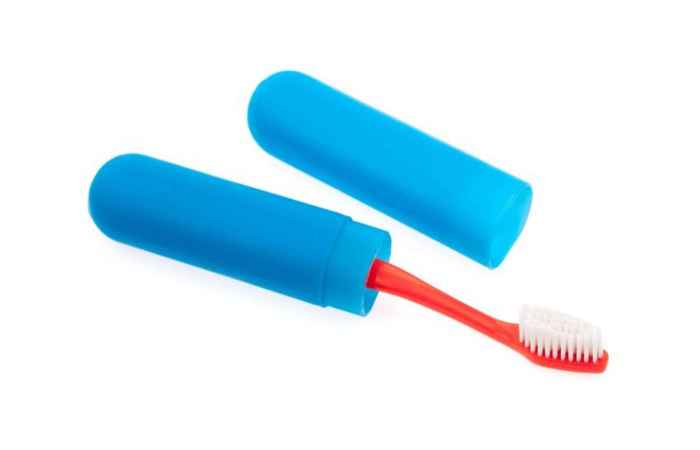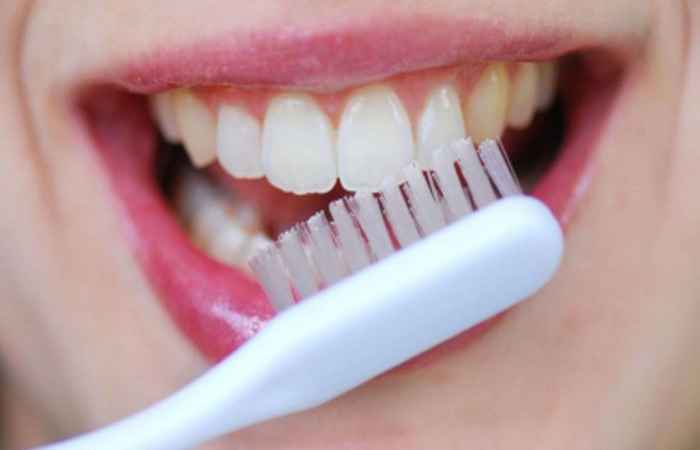Research reveals that over 10 billion microbes live on our toothbrush at any given point in time, and it is important to make sure you’re not making any terrible hygiene mistakes that may cost you more for your dental health.
You see, toothbrushes are the perfect ground that attracts all kinds of bacteria, viruses, mold, mildew and even fungi, and hence, it is important to keep it protected and nicely covered. The kinds of bacteria that can be found near and on a toothbrush is truly diverse and unlimited, and it can range from the bacteria present in the mouth and known to be the culprits of tooth decay or gum diseases, along with the deadly E. coli and even strep bacteria.

How Unsafe is your Toothbrush? We’ve compiled the five basic hygiene mistakes that we all commonly make while handling, storing and using our toothbrushes.
Here, take a look and see if you’re making the same mistakes too:
1. Your Toothbrush is Stored near the Toilet
Majority of the people keep their toothbrushes in their bathrooms, which makes it incredibly easy for the toothbrush to capture all kinds of microbes and fecal matter that you simply do not want inside your mouth.
RELATED: 8 Foods to Avoid If You Have Sensitive Teeth
If you are storing your toothbrush within six feet of your toilet, experts believe that this proximity is too unhealthy and unsafe. Most people don’t understand that their toothbrush is more likely to attract and store greater bacteria than their toilet seats.

2. Your Toothbrush has a Plastic Holder
The way we store our toothbrush before and after brushing sessions has a detrimental impact of the quantity of germs and bacteria that get captured between the bristles of the brush. You see, storing the toothbrush in a plastic holder happens to be one of the most unsafe ways of storing a brush.
When you store your toothbrush in a plastic container or toothbrush cap, you basically store them up in a petri dish-like container that encourages the growth of bacteria and viruses inside. Various dental health experts and organizations have strictly advised against plastic holders for mouth washes, mouth guards, toothbrushes and other products for your dental hygiene.
RELATED: 15 Mind-Boggling Facts About The Human Body
Moreover, storing your toothbrush upright in a plastic holder or cup also encourages exposure to germs, airborne viruses and microbes. Instead of using plastic holders and containers, experts advise buying a fabric toothbrush shield, which aids in eliminating all kinds of moisture and saliva from your toothbrush, along with building an effective defense against germs and airborne viruses.

3. Microwaving the Toothbrush to Sterilize it
If you believe that you can disinfect your toothbrush by popping it into the microwave for a few seconds, this is truly the worst possible blunder you can make to make your toothbrush unhygienic. Majority of the people believe that microwaving the toothbrush will allow it to be sterilized, but actually, they end up heating the plastic or nylon. You see, most toothbrush brands are made with either plastic, nylon or silicone, and microwaving either of these materials will cause harm and denaturing.
For instance, a nylon toothbrush will be completely useless after a trip in the microwave as the bristles will totally fall apart. Microwaving a plastic toothbrush can create grave dental health risks by exposing your mouth to a deadly chemical found in most varieties of plastic, bisphenol-A (BPA), which has been associated with a wide range of illnesses and chronic ailments, including multiple kinds of cancers and even infertility.
Instead of microwaving your toothbrush, you can easily sterilize it by washing your dirty brush with lukewarm water and a tiny quantity of soap. Then, cover the toothbrush with a fabric cover to prevent it from being infected again. Moreover, experts strongly advise investing in at least four different toothbrushes a year.

4. Believing that Toothpaste can make your Brush Clean
Many people believe that toothpastes can disinfect the toothbrush, but truth be told, a normal toothpaste formula that is loaded with chemicals really has no effect on the bacteria or viruses lurking on the brush. Even if the toothbrush reads antibacterial on the label, it is better to steer clear of such marketing gimmicks. Experts reveal that the human mouth is laden with billions of healthy bacteria, in a region that is known as the oral microbiome.
Now, then the oral microbiome is flourishing with good health, the mouth is fortified against all harmful bacteria and viruses lurking in the air and environment. However, the oral microbiome tends to be unhealthy in a large number of people who use damaging products, such as mouthwashes that contain alcohol and detergent-like toothpaste formulas.

5. Your Toothpaste is laden with Chemicals
Does your toothpaste contain an unnecessary amount of chemicals? If you’re using un-medicated and mass produced brands like Colgate, your toothpaste is most likely to be laden with chemicals. Dental experts believe that is important to steer clear of toothpaste brands that contain harmful chemicals, particularly triclosan copolymer and sodium laurel sulfate.
You see, sodium laurel sulfate, an emulsifier, is actually a detergent and tends to be very irritating for the mouth and gums. Experts have warned that this particular chemical is one of the widely identified causes of increase in canker sores. Moreover, there is a compelling amount of research that raises concerns over exposure to triclosan, which is basically an antifungal and antibacterial compound that might be raising the strains of resistant bacteria.
It is important to understand that sound and good oral health is necessary to fortify and strengthen the overall health of your body. Eliminating the risk factors of oral diseases and boosting your dental health is the first and foremost preventive measure to ensure a long and mindful life.
Needless to say, the mouth is one of the greatest breeding grounds of inflammation, allowing it to spread throughout the body, and if you can counter inflammation with a powerful and flourishing dental health, you can escape the hazards of inflammation, which threaten to deteriorate your health and strength.







Comments
Loading…